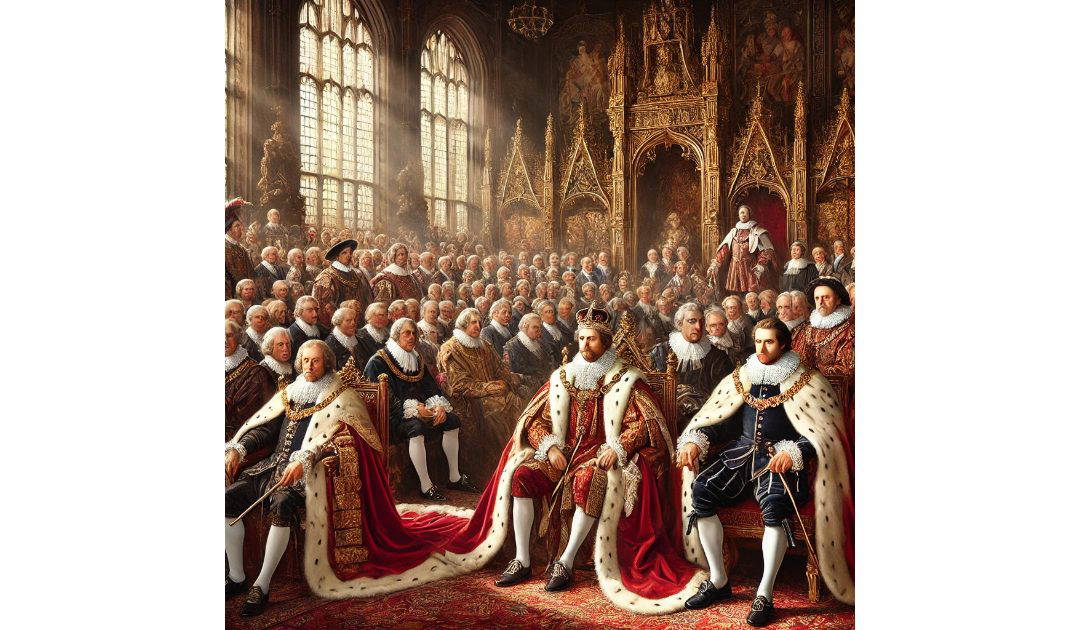The Happy Parliament of 1624 was the last Parliament of King James I of England and earned its name because it convened in a period of rare agreement between the king, his son Prince Charles, and Parliament. It was opened on the 19th of February and marked a significant shift in foreign policy setting the stage for the early years of Charles I’s reign. Despite James I’s declining health and usual conflicts with Parliament, this session was characterised by greater cooperation, largely due to shared hostility toward Spain and broad support for war.
By 1624, James I’s foreign policy had become deeply unpopular. For much of his reign, James had pursued a policy of peace, particularly with Spain, England’s long-time Catholic rival. He had attempted to secure an Anglo-Spanish alliance by negotiating a marriage between his son, Prince Charles, and the Spanish Infanta, Maria Anna. However, these negotiations, known as the Spanish Match, were widely opposed in England, especially by Parliament and Protestant factions who saw Spain as England’s greatest enemy.
In 1623, Prince Charles and the Duke of Buckingham (James’s powerful favorite) traveled in disguise to Spain in a failed attempt to secure the marriage. Their humiliating treatment by the Spanish court turned them against Spain, and they returned to England demanding war. This reversal in policy brought Charles and Buckingham into alignment with Parliament, which had long called for a more aggressive stance against Spain.
The combination of James’s weakening authority, Charles’s growing influence, and widespread anti-Spanish sentiment created a unique moment of unity, leading to what became known as the Happy Parliament.
With Charles and Buckingham now leading the anti-Spanish faction, the 1624 Parliament strongly opposed any further negotiations with Spain. Parliament supported a war against Spain, particularly to aid the Protestant cause in Europe, as the Thirty Years’ War (1618-1648) was raging and Protestant states were struggling against Catholic forces.
Parliament approved funds for military preparations, although they insisted on controlling how the money was spent. James, who had long been reluctant to fight Spain, was too weak to resist the overwhelming demand for war.
The Happy Parliament saw significant debates over parliamentary privileges and the rule of law, led by figures like Sir Edward Coke. Parliament reasserted its right to discuss matters of foreign policy, something James had previously claimed was solely the king’s prerogative.
Coke and other MPs also pushed for greater accountability in government and sought to curtail corruption, particularly targeting officials associated with unpopular policies and financial mismanagement. These discussions set the stage for similar constitutional conflicts under Charles I.
One of the key events of this Parliament was the impeachment of Lionel Cranfield, Earl of Middlesex, the Lord Treasurer. Cranfield had been an important financial adviser to James and had implemented several cost-cutting measures. However, he was closely associated with James’s earlier pro-Spanish policies and was accused of corruption.
With Prince Charles and Buckingham backing his removal, Parliament successfully impeached Cranfield, marking one of the few times under James I that Parliament exercised its impeachment powers. This set an important precedent for Parliament’s ability to hold royal officials accountable.
While Parliament agreed to fund military efforts against Spain, there was significant debate over how the money should be managed. MPs were wary of giving the king unrestricted financial support, fearing he might use it in ways they disapproved of (as had happened in previous conflicts). Parliament insisted on oversight of military spending, which became a key issue in later Stuart reigns.
Though Parliament authorised funds, they were ultimately insufficient for a large-scale war, leading to problems in the early years of Charles I’s rule when military campaigns against Spain and France ended in disaster.
The 1624 Parliament adjourned later that year, having significantly reshaped England’s foreign policy and strengthened Parliament’s role in governance. James I, now in poor health, played little role in its later sessions. He died in March 1625, shortly after the Parliament ended, leaving his son Charles to inherit the throne.
Despite the initial unity of the Happy Parliament, the seeds of future conflicts had been sown. Charles I’s insistence on royal authority, his handling of military campaigns, and his financial policies would soon bring him into direct conflict with Parliament, eventually leading to the English Civil War (1642-1651).
The Happy Parliament of 1624 was unique in James I’s reign due to the rare alignment of interests between the monarchy and Parliament. It ended the Spanish Match negotiations, set England on the path to war with Spain, and strengthened Parliament’s role in foreign policy and government accountability. While it marked a high point in cooperation, it also laid the groundwork for the tensions that would define Charles I’s troubled reign.
I confess I’m not a fan of King James I. He sent my ancestor, Sir Anthony Standen, to the Tower of London charged with treason. Thankfully Sir Anthony was later released, as related in The Spy who Sank the Armada, the first book in the Sir Anthony Standen Adventures.

